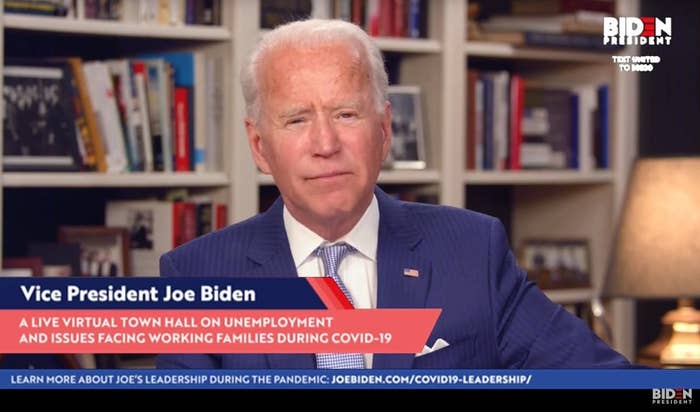
This couldn’t have been how Joe Biden imagined his first public appearance as the presumptive Democratic nominee for president: speaking from his Delaware basement to a tiny audience scattered across the country as networks carried President Donald Trump on live TV.
But that was Biden’s reality Wednesday night, sticking to a virtual town hall that was planned before Bernie Sanders, his last significant rival, suspended his campaign earlier in the day.
There was no rallying cry, no call to join him in his effort to defeat Trump this fall. Nearly four years ago, when California’s primary results clinched the nomination for Hillary Clinton, she addressed 3,600 supporters beneath a glass ceiling, a symbolic setting worthy of her historic moment as the first woman to be a major party’s candidate for president. Biden, seated in front of some bookcases, peaked at about 1,700 viewers, according to a YouTube counter.
It was another striking example of how the coronavirus has preempted a national election. Biden’s moment wasn’t much of one.
The only mention of the race came at the top of his 45-minute event, when he offered kind, prepared words for Sanders before quickly pivoting to the pandemic.
“Bernie’s always been a passionate voice for progress,” Biden said, echoing sentiments he had shared hours earlier in an emailed statement and on Twitter. “He put his heart and soul not only into running for president but also the causes and issues he has been dedicated to his whole life. He’s inspired and energized millions of supporters, especially young voters, to join him in championing a progressive vision for our country. He didn’t just run a political campaign; he created a movement. And that’s a good thing for the nation and for our future.”
Biden’s campaign picked other spots to acknowledge the presumptive inevitability of his nomination this summer, whenever and however Democrats conduct their national convention.
“It’s Joe Biden, and I will be your Democratic nominee for president,” read a fundraising text message sent to the former vice president’s supporters before the virtual town hall event.
Earlier on Wednesday, at a virtual fundraiser, Biden’s wife, Jill, expressed relief. “Thank goodness we can finally get to work,” she said, according to a pool report. “We could never presume that before. This has all been all brand-new and happened so, so quickly.”
Everything is virtual and online now for the foreseeable future. Biden has been addressing the country via video for several weeks, talking mostly about the coronavirus and criticizing Trump’s handling of it. The approach has yielded limited attention for a candidate who, because he has no official capacity to assist with the crisis, is not liable to make much news. Until Wednesday, his biggest breakthrough, played to full dramatic effect by bored political reporters, was a back-and-forth over whether he’d call Trump to discuss the issue. (They spoke Monday. Judging by their respective accounts, it was an uneventful exercise.)
In practice, Sanders’ departure didn’t change much for Biden. He already had given Sanders a heads-up that he planned to start his search for a running mate. Greg Schultz, Biden’s first campaign manager who was replaced last month by Jen O’Malley Dillon, already had been making plans to transition into a role at the Democratic National Committee, where he’s expected to coordinate general election efforts between the campaign and party.
Rather than explicitly declare victory over Sanders, Biden kept with the plan Wednesday night: a discussion with union workers moderated by Yvanna Cancela, a state senator in Nevada. The topic was “unemployment and issues facing working families” — something Biden talks about as a candidate, but an area that was more central to Sanders’ campaign. The discussion was pegged specifically to the job losses and economic hardships related to the coronavirus, and Biden traded on his more folksy mannerisms. Two of the women who asked questions addressed the former vice president by his first name. “You’re going to get through this, kiddo,” Biden told Lovette Jacobs, an electrical worker who appeared via video from Boston.
As he closed the town hall, Biden made a pitch clearly intended for Sanders’ young supporters — a cohort he’s been aiming to reach in the weeks since his hold on the nomination strengthened.
“This millennial generation, of which you’re a part, has gone through a hell of a circumstance over the last 15 years,” he told Cancela as he winded up an argument for partial forgiveness of student loans. “They ended up in a situation where … because of the financial crisis in the previous administration before us, they ended up in a situation where they were behind the 8-ball.”
Biden continued. “Now you have this so-called new generation, Z generation, coming along, and they’re missing out on so much. … They’re not having their graduation parties. They’re not having their prom. They’re not having commencement. They’re having to give up on an awful lot of things.”
Outreach to younger Sanders voters has been and will continue to be a tricky thing for Biden. A recent poll from ABC News and the Washington Post found that 15% of Sanders’ supporters would vote for Trump over Biden. His first statement on Sanders’ departure Wednesday acknowledged the weight their movement carries.
“While the Sanders campaign has been suspended,” Biden said in the initial remarks emailed by his campaign, “its impact on this election and on elections to come is far from over.”
